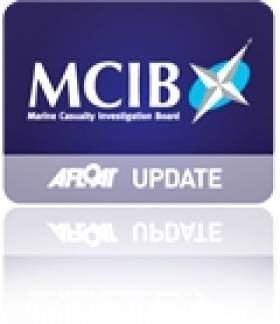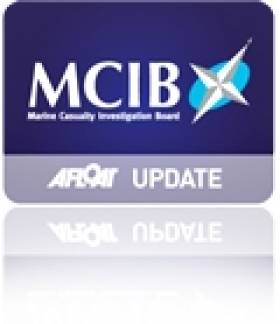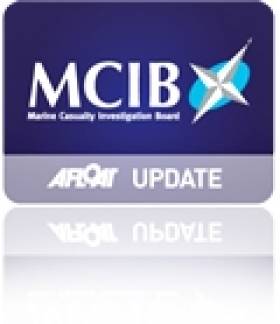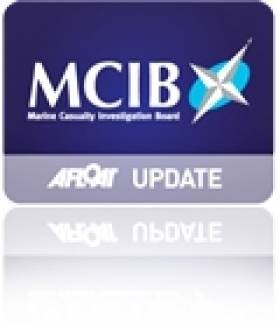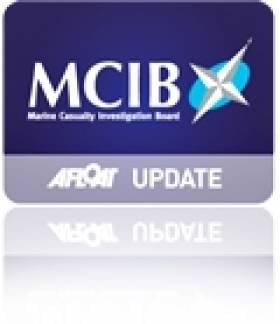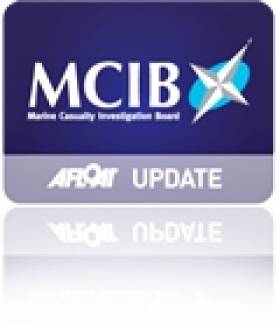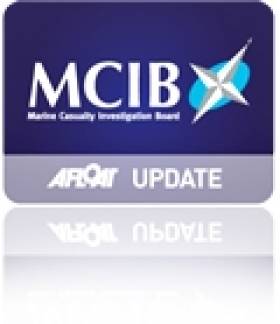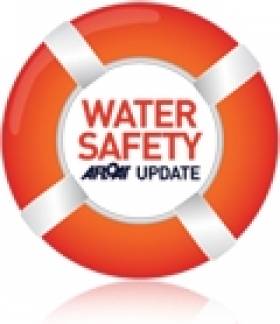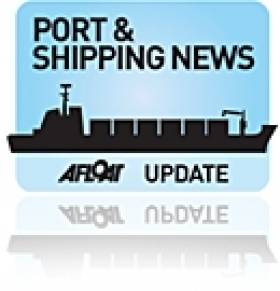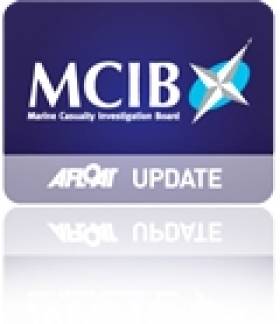Displaying items by tag: Marine Casualty Investigation Board
Epilepsy, Lack of Lifejacket Big Factors in Death of Dublin Boatman - MCIB
#MCIB - The death by drowning of a South Dublin boatman may have been avoided had he been wearing a lifejacket or buoyancy aid, according to investigators.
The report by the Marine Casualty Investigation Board (MCIB) into the death of Aidan Fennell off Dalkey Island on 12 October 2010 found that an epileptic episode could have caused him to fall overboard from his rowboat and become disorientated once in the water.
Fennell, 43, was considered a competent boatman and a strong swimmer used to cold water, though was prone to seizures where he could not control his muscles and lost sense with reality, on occasion becoming unconscious.
On the afternoon of 12 October last year Fennell had launched his boat from Coliemore Harbour in fair conditions, intending to ferry a German family to Dalkey Island. When they pulled out of the trip, Fennell decided to row to the island on his own, with no flotation devices on board.
He was last seen by friend Kevin O'Farrell at 2.50pm. Around half an hour later, O'Farrell became concerned as to Fennell's whereabouts when he had been out of sight for some time.
After notifying the Irish Coast Guard, the Dun Laoghaire lifeboat and coastguard helicopter Rescue 116 were dispatched to search the area. Fennell's boat was located before 4pm washed on the rocks at the southeast end of Dalkey Island, and his body was found in the water close by some 10 minutes later.
No injuries were found on Fennell's body, suggesting that he went into the water before his boat washed up on the rocks.
The report concluded that if he had fallen overboard in normal conditions "it is considered likely that he could have swum to his boat, or clung on to the oars.
"However, if he had suffered an epileptic episode... he would have had great difficulty in staying afloat, in particular without having the buoyancy assistance of a life jacket."
The full report is available to download as a PDF from the MCIB website HERE.
MCIB Report on Sinking of Fishing Vessel 'Ainmire'
A breach in the engine compartment caused the fishing vessel Ainmire to take on water and sink off the coast of Scotland in April last year, according to the official report into the incident.
All crew on board the vessel were transferred safetly to another fishing boat that responded to its distress call, some 30 miles northwest of the Butt of Lewis on the morning of 29 April 2010.
The Marine Casualty Investigation Board (MCIB) report concluded that the failure of a sea water cooling pipe in the engine room was the most likely cause of the flooding, and pointed to the fact that the pipework had not been renewed during the life of the vessel.
It was also noted that the bilge pump and its motors were located under the floor plates in the engine room, and thus were inoperable when the water level had risen in the compartment.
In addition, the MCIB report found that the Ainmire has been operating without a Fishing Vessel Safety Certificate for more than six months at the time of the incident.
Though the owner had submitted a survey application and paid the required fee to the Marine Survey Office (MSO) the previous summer, a communication breakdown resulted in the required survey not being carried out before the expiration of the vessel's previous certification.
The MCIB advised boat owners and operators to be extra vigilant regarding the location of bilge pumps in their vessels.
It also warned that survey applications for certification "may not accommodate all situations", and that the issuing of a recepit is not a guarantee that an application is being dealt with.
The full report is available to download as a PDF from the MCIB website HERE.
MCIB Highlights Danger of Fishing Without Safety Gear
The Marine Casualty Investigation Board (MCIB) has called on the Government to continue highlighting the dangers of operating boats without adequate safety equipment, following its report into the death of a Wexford fisherman last year.
Michael O'Connor drowned after going overboard from his small open boat while fishing alone at Cullenstown, Co Wexford in the early hours of 7 September 2010.
The local Irish Coast Guard unit initiated a search when he did not return as expected later in the morning. His body was subsequently located next to his upturned boat around 9am.
It is not known to investigators how O'Connor came to be in the water when the incident occurred. He was found to be wearing a lifejacket, but no flares, VHF radio or other safety equipment were found on board his vessel.
The boat itself was also not a registered fishing vessel, and was unsuitable for carrying the fishing gear O'Connor had been using.
The report stated: "The combination of boat size, darkness, weather conditions, tidal flow, fishing equipment and the absence of safety equipment other than a lifejacket combined to increase the danger and reduce the chance of survival."
The full report is available to download as a PDF from the MCIB website HERE.
Families Disagree with MCIB Report on F/V Jennifer
The Irish Examiner reports that the families of two fisherman who drowned off Malin Head last November disagree with the findings of the official investigation into the tragedy.
Eddie Doherty, 65, and his nephew Robert McLaughlin, 41, died after their small fishing boat F/V Jennifer capsized and sank off Glengad on 1 November last year.
The official report released last week by the Marine Casualty Investigation Board (MCIB) found that a combination of high winds in the area and unstable weight on the boat due to the crab pots it was carrying most likely caused the vessel to list to an angle from which it could not be recovered.
But Eddie Doherty's widow said she disagreed with this conclusion.
"With Eddie’s experience and his regard for safety the load would have been spread evenly over the deck of the boat and therefore this would not have had an adverse affect on the stability of the boat," said Marian Doherty.
The full MCIB report is available to read in full HERE.
Flares No Help to Mayo Fishermen Stranded at Sea - MCIB Report
Two Mayo fishermen stranded at sea after their boat capsized were not assisted after they used flares, a Marine Casualty Investigation Board (MCIB) report has found.
The report, released earlier this week, recounted that the 33m crabber Léim an Bhradán had set out from Porturlin in Ballina on the morning of Saturday 30 October last on a routine fishing trip to retrieve and reset crab and lobster pots some 12 to 15 miles offshore.
The vessel was manned by skipper John O’Donnell, aged 18 at the time, and crew Nathan Flannery, in his 20s, both young men but with many years of fishing experience between them.
At some time between 1pm and 1.45pm, after having successfully hauled and re-shot one tow of pots, a second tow, in the process of being hauled, was partially aboard being emptied and re-baited.
The vessel was listing slightly to starboard due to the pots being hauled over that side when a large wave broke over the starboard quarter and flooded the working deck.
This caused the vessel to list further to starboard, allowing more water over the side and causing the stacked pots and boxes to shift, increasing the angle of the list and throwing both men into the water before the boat capsized and sank rapidly.
The boat's canister-type liferaft, which was not secured to the vessel but stored in a cradle on top of the wheelhouse, floated to the surface with a life ring. O’Donnell and Flannery managed to inflate the raft and climb aboard around 2pm, after some difficulties in operating the gas inflation cannister and releasing the raft from its securing straps.
The men then opened the SOLAS B equipment pack stored on the liferaft and released two parachute flares, 20 minutes apart, with no response. At around 3pm the pair spotted an Irish Coast Guard helicopter and released an orange smoke signal, but the chopper did not respond. It later transpired that this aircraft was the Sligo-based coastguard helicopter on a training exercise.
Several hours later, the alarm was raised ashore when the Léim an Bhradán had not returned to port. A rescue helicopter and lifeboat were tasked to the scene before midnight and the liferaft was located just after 1.30am.
O’Donnell and Flannery, who had earlier donned thermal suits to protect from the cold, were picked up and brought ashore by the lifeboat. Neither was injured in the incident.
The MCIB report found that had the lifeboat been secured to the vessel, it would have been in a position to inflate correctly as per its design.
It also found that had the EPIRB emergency beacon been mounted to a 'float free' bracket outside the wheelhouse, rather than stored inside, it would have floated to the surface and activated automatically, notifying the coast guard immediately.
Neither skipper nor crew was in possession of the boat's handheld VHF set, the report noted, which hampered their ability to contact any nearby vessels for assistance.
Quo Vadis Deaths Result of Misadventure, Says MCIB Report
Investigators have published their investigation report into the death of two yachtsmen off Inishboffin in October last year.
Donal McEllin, 63, and Ger Feeney, 56, died while attempting to return to their motor yacht Quo Vadis in the early hours of 10 October.
The inquiry by the Marine Casualty Investigation Board (MCIB) found that the pair had set off for the yacht - which was moored in Inisboffin Harbour - on a motor-driven inflatable tender after several hours socialising in Day's Pub on the island.
The report also found that they had declined an offer to be ferried back to the yacht.
A witness, Ian Day, recounted that he drove his jeep to the end of the pier and used his headlights to assure himself that the tender had reached the vessel. Though it had been agreed with both men that they would turn off the external lights on the vessel when they safely boarded, it was assumed that they had forgotten.
The bodies of both men were discovered the following morning. Mr. McEllin’s body was found lying on West Quarter Beach adjacent to where the vessel was moored, while Mr. Feeney’s body was found afloat, lying under the upturned tender. Mr. McEllin’s lifejacket had inflated but was entangled around his neck, indicating that the groin strap was not properly tied.
Based on the available evidence, the MCIB concluded that the deaths were the result of attemping a night-time transfer from a small inflatable boat to a larger vessel swinging on its mooring, combined with "possible tiredness and diminished human performance resulting from the effects of alcohol".
The full MCIB report is available for download below.
The report by the Marine Casualty Investigation Board (MCIB) into the loss of a kayaker in Castletownshend last year has found the death was caused by hypothermia and heart failure due to a pre-existing condition.
Didier Heneault, 56, died while kayaking with his wife Margaret near Horse Island, after his kayak overturned in choppy water.
The French couple, who were experienced kayakers, had set off from the League near Raheen Town in Co Cork on the morning of 30 May 2010, paddling south-east.
On the western side of Horse Island, Mrs Heneault turned and saw that her husband was in thw water about 10m from his kayak. She tried to assist him in climbing out of the water back into the kayak but was unsuccessful.
Mrs Heneault used a safety rope to keep her husband afloat, but after 10 minutes he became unresponsive.
Some hours later passing kayakers heard Mrs Heneault's calls for help and assisted in towing the couple back to shore at Horse Island, where they gave Mr Heneault CPR. They were joined shortly after by the Baltimore Inshore Lifeboat and the Toe Head coastguard unit.
Mr Heneault was transferred to a waiting ambulance at Castletownshend pier where he was treated by paramedics before being taken to Cork University Hospital. There he was pronounced dead at 4.50pm.
The report into the incident by the MCIB said the post-mortem gave the cause of death as cardiac failure due to hypertensive cardiomyopathy following immersion in cold water and associated hypothermia, with a medical history of hypertension.
The report also recommended that lifejackets should be used instead of buoyancy aids when offsore kayaking, where the risk of capsizing is greater. A lifejacket of 150 Newtons or more would have kept Mr Heneault's head above water at all times, it said.
Report Into Loss of Janireh Crewman Now Online
The full report of the investigation into the loss of a crewman from the fishing vessel Janireh earlier this year is now available online.
Egyptian national Nadi Sehsaah died after falling overboard from the trawler some 20 nautical miles south west of Mizen Head. It is believed he was not wearing a flotation device at the time of the accident.
The Marine Casualty Investigation Board (MCIB) has said there is an onus on the fishing industry to improve safety standards across the board, according to the Irish Examiner - which has more on the story HERE.
The MCIB report is available to download HERE.
Inspection of Refloated Ship in Galway Bay Under Way
Marine surveyors are currently inspecting the German cargo ship which was refloated yesterday in Galway Bay after running aground early on Thursday.
The Irish Coast Guard confirmed to The Irish Times that no pollution had occurred in the grounding of the Pantanal on the south Connemara coast.
The 120m vessel was refloated at high tide yesterday morning with help from the Celtic Isle tug from Foynes in Co Limerick.
Ship managers Harren & Partner said the hull would undergo a diver inspection before the vessel sails for dry dock.
Yesterday Minister for the Marine Simon Coveney welcomed the "successful operation in very challenging conditions" and confirmed a thorough investigation of the incident by the Marine Casualty Investigation Board.
The ship had been sailing from the Mediterranean to Rossaveal to collect two monohull ferries, sold to Mauritius, that had been built to serve the Aran Islands route.
The Irish Times has more on the story HERE.
High Praise for Captain and Crew of 'Asgard II'
The impact assumption and liferaft issue in the report are already issues known about for some time.
The vessel which sank in the Bay of Biscay on 11 September 2008 while on route to La Rochelle, France was carrying 5 crew and 20 trainees.
All on board were evacuated safely from the vessel and transferred to the ships life rafts where they were brought to the island of Bel Ille by the French coastguard.
Minister or Defence, Mr. Tony Killeen commented that while the findings into the cause of the sinking are inconclusive it recognises that the vessel was equipped and maintained in excess of the statutory requirements and that higher safety standards were in place on the ship which were above those required by legislation.
The Minister also noted that the report acknowledges the leadership shown by the ship's Master, Colm Newport and he commended his and the crew's handling of the emergency situation.
The full report is available for download below.
Raise the Asgard - Afloat's 2008 online petition

























